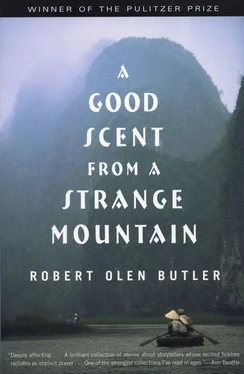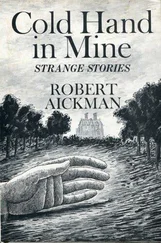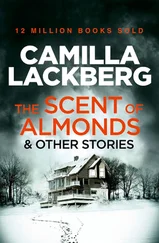This is an angry voice, a voice with feeling. I have been in this place now for a year. I am seventeen and it took even longer than nine years, seven months, fifteen days to get me out of Vietnam. I wish I could say something about that, because I know anyone who listens to my story would expect me right now to say how I felt. My mother and me were left behind in Saigon. My father went on ahead to America and he thought he could get some paperwork done and prepare a place for us, then my mother and me would be leaving for America very soon. But things happened. A different footlocker was lost and some important papers with it, like their marriage license and my birth certificate. Then the country of South Vietnam fell to the communists, and even those who thought it might happen thought it happened pretty fast, really. Who knew? My father didn’t.
I look at a letter he sent me in Saigon after it fell and the letter says: “You can imagine how I feel. The whole world is let down by what happened.” But I could not imagine that, if you want to know the truth, how my father felt. And I knew nothing of the world except Saigon, and even that wasn’t the way the world was, because when I was very little they gave it a different name, calling it H  Chí Minh City. Now, those words are a man’s name, you know, but the same words have several other meanings, too, and I took the name like everyone took the face of a child of dust: I looked at it one way and it meant one thing and then I looked at it a different way and it meant something else. H
Chí Minh City. Now, those words are a man’s name, you know, but the same words have several other meanings, too, and I took the name like everyone took the face of a child of dust: I looked at it one way and it meant one thing and then I looked at it a different way and it meant something else. H  Chí Minh also can mean “very intelligent starch-paste,” and that’s what we thought of the new name, me and some friends of mine who also had American fathers. We would meet at the French cemetery on Phan Thanh Gi
Chí Minh also can mean “very intelligent starch-paste,” and that’s what we thought of the new name, me and some friends of mine who also had American fathers. We would meet at the French cemetery on Phan Thanh Gi  n Street and talk about our city — H
n Street and talk about our city — H  , for short; starch-paste. We would talk about our lives in Starch-Paste City and we had this game where we’d hide in the cemetery, each in a separate place, and then we’d keep low and move slowly and see how many of our friends we would find. If you saw the other person first, you would get a point. And if nobody ever saw you, if it was like you were invisible, you’d win.
, for short; starch-paste. We would talk about our lives in Starch-Paste City and we had this game where we’d hide in the cemetery, each in a separate place, and then we’d keep low and move slowly and see how many of our friends we would find. If you saw the other person first, you would get a point. And if nobody ever saw you, if it was like you were invisible, you’d win.
The cemetery made me sad, but it felt very comfortable there somehow. We all thought that, me and my friends. It was a ragged place and many of the names were like Couchet, Picard, Vernet, Believeau, and these graves never had any flowers on them. Everybody who loved these dead people had gone home to France long ago. Then there was a part of the cemetery that had Vietnamese dead. There were some flowers over there, but not very many. The grave markers had photos, little oval frames built into the stone, and these were faces of the dead, mostly old people, men and women, the wealthy Vietnamese, but there were some young people, too, many of them dead in 1968 when there was much killing in Saigon. I would always hide over in this section and there was one boy, very cute, in sunglasses, leaning on a motorcycle, his hand on his hip. He died in February of 1968, and I probably wouldn’t have liked him anyway. He looked cute but very conceited. And there was a girl nearby. The marker said she was fifteen. I found her when I was about ten or so and she was very beautiful, with long black hair and dark eyes and a round face. I would always go to her grave and I wanted to be just like her, though I knew my face was different from hers. Then I went one day — I was almost her age at last — and the rain had gotten into the little picture frame and her face was nearly gone. I could see her hair, but the features of her face had faded until you could not see them, there were only dark streaks of water and the picture was curling at the edges, and I cried over that. It was like she had died.
Sometimes my father sent me pictures with his letters. “Dear Fran,” he would say. “Here is a picture of me. Please send me a picture of you.” A friend of mine, when she was about seven years old, got a pen pal in Russia. They wrote to each other very simple letters in French. Her pen pal said, “Please send me a picture of you and I will send you one of me.” My friend put on her white aó dài and went downtown and had her picture taken before the big banyan tree in the park on Lê Thánh Tôn. She sent it off and in return she got a picture of a fat girl who hadn’t combed her hair, standing by a cow on a collective farm.
My mother’s father was some government man, I think. And the communists said my mother was an agitator or collaborator. Something like that. It was all mostly before I was born or when I was just a little girl, and whenever my mother tried to explain what all this was about, this father across the sea and us not seeming to ever go there, I just didn’t like to listen very much and my mother realized that, and after a while she didn’t say any more. I put his picture up on my mirror and he was smiling, I guess. He was outside somewhere and there was a lake or something in the background and he had a T-shirt on and I guess he was really more squinting than smiling. There were several of these photographs of him on my mirror. They were always outdoors and he was always squinting in the sun. He said in one of his letters to me: “Dear Fran, I got your photo. You are very pretty, like your mother. I have not forgotten you.” And I thought: I am not like my mother. I am a child of dust. Has he forgotten that?
One of the girls I used to hang around with at the cemetery told me a story that she knew was true because it happened to her sister’s best friend. The best friend was just a very little girl when it began. Her father was a soldier in the South Vietnam Army and he was away fighting somewhere secret, Cambodia or somewhere. It was very secret, so her mother never heard from him and the little girl was so small when he went away that she didn’t even remember him, what he looked like or anything. But she knew she was supposed to have a daddy, so every evening, when the mother would put her daughter to bed, the little girl would ask where her father was. She asked with such a sad heart that one night the mother made something up.
There was a terrible storm and the electricity went out in Saigon. So the mother went to the table with the little girl clinging in fright to her, and she lit an oil lamp. When she did, her shadow suddenly was thrown upon the wall and it was very big, and she said, “Don’t cry, my baby, see there?” She pointed to the shadow. “There’s your daddy. He’ll protect you.” This made the little girl very happy. She stopped shaking from fright immediately and the mother sang the girl to sleep.
The next evening before going to bed, the little girl asked to see her father. When the mother tried to say no, the little girl was so upset that the mother gave in and lit the oil lamp and cast her shadow on the wall. The little girl went to the wall and held her hands before her with the palms together and she bowed low to the shadow. “Good night, Daddy,” she said, and she went to sleep. This happened the next evening and the next and it went on for more than a year.
Then one evening, just before bedtime, the father finally came home. The mother, of course, was very happy. She wept and she kissed him and she said to him, “We will prepare a thanksgiving feast to honor our ancestors. You go in to our daughter. She is almost ready for bed. I will go out to the market and get some food for our celebration.”
So the father went in to the little girl and he said to her, “My pretty girl, I am home. I am your father and I have not forgotten you.”
Читать дальше

 Chí Minh City. Now, those words are a man’s name, you know, but the same words have several other meanings, too, and I took the name like everyone took the face of a child of dust: I looked at it one way and it meant one thing and then I looked at it a different way and it meant something else. H
Chí Minh City. Now, those words are a man’s name, you know, but the same words have several other meanings, too, and I took the name like everyone took the face of a child of dust: I looked at it one way and it meant one thing and then I looked at it a different way and it meant something else. H  n Street and talk about our city — H
n Street and talk about our city — H  , for short; starch-paste. We would talk about our lives in Starch-Paste City and we had this game where we’d hide in the cemetery, each in a separate place, and then we’d keep low and move slowly and see how many of our friends we would find. If you saw the other person first, you would get a point. And if nobody ever saw you, if it was like you were invisible, you’d win.
, for short; starch-paste. We would talk about our lives in Starch-Paste City and we had this game where we’d hide in the cemetery, each in a separate place, and then we’d keep low and move slowly and see how many of our friends we would find. If you saw the other person first, you would get a point. And if nobody ever saw you, if it was like you were invisible, you’d win.










